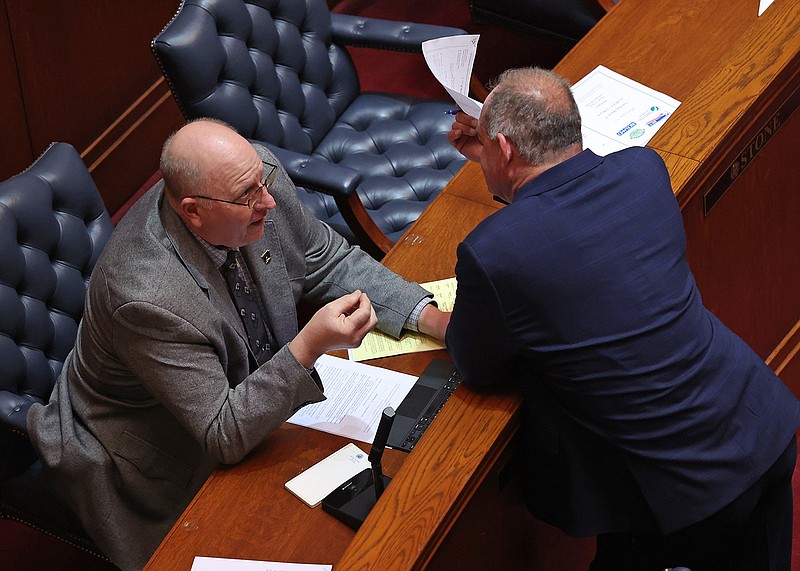The Arkansas Senate on Tuesday narrowly approved a bill that would create criminal penalties for knowingly entering and remaining in a bathroom of the opposite sex while a minor is present.
With six senators not voting and a senator voting present, the Senate voted 19-7 to send Senate Bill 270 by Sen. John Payton, R-Wilburn, to the House for further consideration.
Eighteen votes are required in the 35-member Senate for approval of a bill.
The Senate's approval of the bill came a day after the Senate Committee on Judiciary endorsed the bill for the second time after amending it. The bill cleared the Senate committee last week before the Senate voted to send it to the committee to fix a drafting error in the bill.
Payton told senators that sending the bill back to the Senate committee was a pretty healthy process because "it gave us a chance to point out that this bill does not do near as much as what it is credited to be doing.
"To me, this was quite the compromise," he said.
Payton said the bill would a very high bar for prosecution.
"It is going to be very hard to prove," he said.
"Somebody really is going to have to act out and be obnoxious and be a problem before any prosecutor would pursue such a high bar, and they are going to have a lot of proof in order to gain a conviction in this," Payton said.
The bill comes amid a flood of bills across states addressing transgender issues. So far this year, at least 155 such measures have been introduced, according to the Human Rights Campaign.
Opponents have contended that SB70 would create the most extreme bathroom ban in the nation if enacted and could lead to the prosecution of transgender people for using public restrooms while doing little to protect minors from sexual indecency.
The legislation goes even further than a North Carolina bathroom law that was enacted in 2016 and later repealed following widespread boycotts and protests. That law did not include any criminal penalties.
Sen. Clarke Tucker, D-Little Rock, said there is no other crime on the books that has a physical trait of a person's body as an element of the crime.
"It is about proving what a person's gender was when they were born," he said. 'They might have to bring on an expert witness to prove beyond a reasonable doubt whether a person has a penis or a vagina when they were born. It is really truly bizarre for that to be in a crime. It doesn't exist in any other crime in the state of Arkansas."
Tucker said the bill regulates property of private businesses.
"Every other crime that we have on the books requires harm to the victim," he said. "This would also be unprecedented since it doesn't actually require any harm to a victim."
Sen. Joshua Bryant, R-Rogers, told senators that "I think it is an overreach of what our responsibility is."
"This bill makes a simple occupation of somebody walking into a facility of the opposite sex a misdemeanor act," he said.
He said there are numerous medical issues, such as Crohn's disease, that could cause a person to occupy a restroom of the opposite sex.
"There are times to be statesmen and times to be politicians, and this issue requires to be statesmen," Bryant said.
But Payton told senators "the bottom line is this bill is in response to the changes in society.
"It is not trying to drag us back," he said.
The legislation would create a criminal penalty for a person 18 or older who knowingly "enters into and remains in a public changing facility that is assigned to persons of the opposite sex while knowing a minor of the opposite sex is present in the public changing facility."
A person who violates this section of the code would be guilty of a Class C misdemeanor.
The bill defines a "public changing facility" as a public or private facility "held out as open to the public and designed to be used at a time during which a person may be in a state of undress in the presence of other persons."
These facilities include "without limitation a restroom, bathroom, locker room, or shower room." The term covers "a private dressing area open to the public that is designed for changing into and out of clothing that is for sale in a commercial establishment that engages in the sale of clothing."
A person's sex as defined by the legislation is their "immutable biological sex as objectively determined by anatomy and genetics existing at the time of birth."
During the committee meeting Monday, Tucker questioned how prosecutors would verify a person's sex and enforce the law. Prosecutor coordinator Bob McMahan said a prosecutor could potentially use search warrants, subpoenaed medical records and blood tests to determine a person's sex.
Sen. Alan Clark, R-Lonsdale, asked on Monday if any laws exist to prevent people from using bathrooms of the opposite sex. McMahan said he was not aware of statutes that would prohibit this.
"With what people want to be the new norms, we seem to have opened a can of worms," Clark said.
Among other exceptions, the bill provides exemptions for parents accompanying minors, people rendering medical assistance, law enforcement officials accompanying a person in their custody and people authorized to maintain and inspect facilities.
Information for this article was contributed by the the Associated Press and Will Langhorne of the Arkansas Democrat-Gazette.
